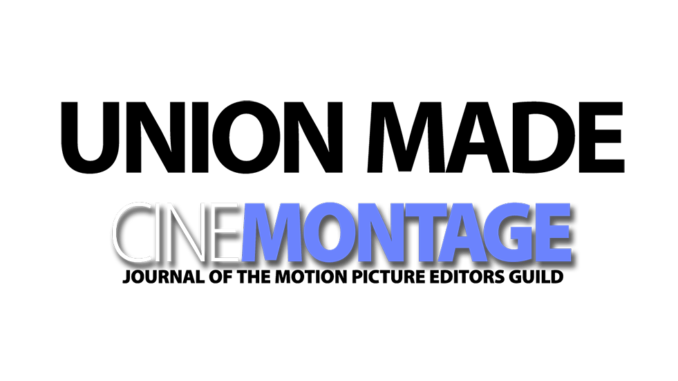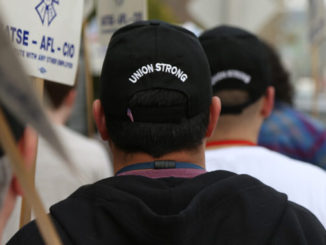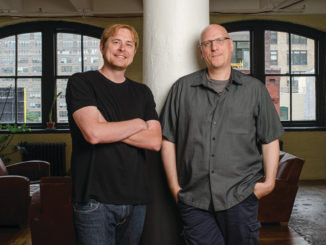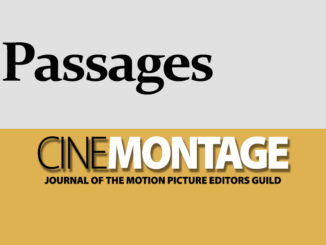
by Steve Mirkovich, ACE
I grew up in Studio City, California and, as a boy, I would pry a hole through the fence of Four Star Republic Studios (now CBS) and play on the Gilligan’s Island and Western back lot sets. My father, a retired Marine Captain, did walk-ons for Dragnet. I am one of 11 kids, most of whom, in one way or another, ended up in show business.
High school in the late 1960s was a turbulent time for young men. While preparing for a scholarship to the Art Centre College of Design, I was sent my draft card and drew a very low lottery number. Just as I received my pre-induction papers, the Vietnam War draft ended. Relieved, but restless and confused, I took to wandering.
After drifting through a series of jobs––photo lab technician, flower delivery guy, bed changer in a motel, beef slicer in a restaurant and shoe salesman––my lucky break came when I dated a girl whose mother lined me up an interview in the Warner Bros. mailroom. I got the gig and started in the mailroom in 1972. As part of my mailroom experience, I gave golf cart guided tours of the studio to guests of executives.
Job positions in all departments of the studio were posted on boards and kids in the mailroom had first pick. A posting appeared for the editing department; I applied, and started as a film messenger for editor Rudi Fehr’s department. In this non-union position, I delivered film cans to projection rooms, rewound film and cleaned out nitrate vaults. After a year, Rudi gave me an opportunity to join the union. It was 1974.
Joining the union grounded me and made me feel that I had the opportunity for a lifelong career. I worked in the coding room, numbering the edges of film for what was a busy studio. After a year, I got my first independent job as an apprentice sound effects editor and left Warner Bros.
As an apprentice, an assistant and an editor, I have had the opportunity to work with––and learn from––some of the best editors of our time.
Then I became a picture apprentice on several films, including All the President’s Men. My first job as an assistant editor was at Universal Television on a series called Baa Baa, Black Sheep for editor Jerry Dronsky. Next, I was offered my first feature as a first assistant to David Bretherton on a film called Winter Kills, starring John Huston and Jeff Bridges.
I had the honor to work with Donn Cambern and remained his first assistant for eight pictures over five years. The last picture I did with him was The Tempest with John Cassavetes. I made a decent wage as an assistant, but I was itching to cut. At age 29, I was offered my first job as an editor on a picture called Jackals. From that picture until today I have edited over 25 feature films in a 20-year period––and haven’t looked back.
Over the course of my career, I have worked with many talented directors with varying degrees of experience. There are good reasons to work with first-time directors as well as with experienced pros like Dick Donner (I just finished working with him on 16 Blocks, a personal career highlight for me).
Some of my favorite jobs were with first-timers. I Know What You Did Last Summer, directed with great energy by Jim Gillespie, was a buzz. On that picture, I was admitted into the Directors Guild and given the opportunity to direct second unit. Having worked with John Carpenter on three films, I honed a gift for scaring people out of their seats with the power of an edit. Then there are those jobs that push you to mental and physical extremes: The Ghost and the Darkness, Con Air and Broken Arrow.
As an apprentice, an assistant and an editor, I have had the opportunity to work with––and learn from––some of the best editors of our time. Editing can be a solitary business so I make an effort to see a lot of movies, read the trades, and keep in touch with people with whom I have worked in the past.
Joining the union grounded me and made me feel that I had the opportunity for a lifelong career.
For people starting out, it helps to attend some story structure seminars. If you learn story jargon, it helps you articulate to a director or producer why you edit their scenes in a particular way. Most of the time, my gut tells me when to cut––but it all has to link back to story and structure.
Africa, Israel, Greece, Australia, Canada, Italy, Mexico––I’ve been lucky to work in many different countries; in fact, I met my wife in Australia while on location. All of the opportunities that I’ve had as a Guild editor are blessings. And yet, I still feel like I’m just getting started…





